STEP ONE: Acquire Goat. STEP TWO: Failing acquiring a goat; acquire a friend with a goat!
My husband gave me my first goat as a wedding present. You may not think that romatic, but Annabelle was one of my best gifts. Ever! I accumulated goats like most women do shoes or handbags. Before long my husband had to lay down some ground rules. "First", he said "No goats on the vehicles or the furniture. And secondly!" I didn't like his tone of voice and was ready to immigrate to the nearest goat friendly island. "If your pets don't earn their keep, then I am selling them all!" A reasonable request. I began...let's say...experimenting, with the oodles of wonderful goats milk. Soon I realized that I needed professional help for the sake of my growing flock. I bought the books and did the cheesemaking courses until I felt better equiped to experiment.
Historically feta is brined curdled cheese from Greece. It was originally made with sheep milk or a blend of milk from both goat and sheep. The earliest record of feta dates back to the writing of the "Odyssey" where Homer refers to this ancient "sliced" cheese which was stored in vats of brine. These days, in the Western world, feta is mass produced commercially using cows milk. Interestingly enough the majority of the world still use goat or sheep dairy although it is a rather foreign concept to many of us from the first world.
For months I have been threatening to post about cheese making as well as soap making. Using goats milk. Naturally. My brother @craigcryptoking keeps asking when I'm going to write my next post. So let's dive in the deep end of the pot of goats milk and begin with Feta, Lesson 1 in #cheesemaking.
Don't be overwhelmed. Making cheese is more simple than you realize as long as you prepare properly. Cheese is like a moody teenager. Very sensitive and prone to explode with the least provocation. Wrong pH. Incorrect temperatures. Not clean equipment. Inconsistent timing. Moldy fruit or bubbling home brews. A stressed cheesemaker. A rogue goat squeezing into the dairy to swig the milk - it all affects the cheese. If you missed out be sure to read my older post:
https://steemit.com/howto/@buckaroo/cheese-lovers-eat-your-hearts-out
YOU WILL NEED:
A big pot
A plastic jug
A large bucket (to strain off the whey)
A tupperware and lid for the moulds
4 to 6 cheese moulds (I used straight pipe that Farmer Buckaroo bored holes into for whey drainage)
A thermometer
A long handled wooden spoon
A long knife (I have a very long pastry pallet knife)
A colander
A piece of cheesecloth/muslin
Bottles for the feta
Rennet
Mesophilic culture (cheese makers use either mesophilic - heat loving - or thermophilic - cold loving cultures)
Plenty of time
Even if you make a teeny batch of feta (or any cheese for that matter) for your family, there are some rules to follow. Before you begin sterilize everything. Make sure you wash all your equipment in hot soapy water and rinse. Then allow to air dry. When you use a drying cloth you can leave a miniscule bacterial residue on your equipment. Because I had a small goat dairy I would make batches of cheese with 40 litres at a time. My pots are mostly huge. For today I will only use a 25 litre pot. This means we are working on 20 litres of goats milk. I never pasturise. The intense heat kills off too many wonderful natural properties. Goats milk is also a natural prebiotic and high in numerous minerals which get damaged by high heat. When milking your goat (by hand or machine) pay particular attention to hygiene and chill the goats milk immediately following milking.
Culture lives in the freezer. Rennet lives in the fridge. They have a long shelf life but don't like room temperature. Over a low heat slowly bring your chilled goats milk to 32 C (90 F) This is the ideal temperature for making most (but not all) cheeses. Turn off the heat! Sprinkle a teaspoon tip of culture over your 20 litres of goats milk. Stir in and allow to stand UNDISTURBED for 45 minutes to 1 hour.
Cheese is like cake and will flop if you bang the pot. After the allotted time add the rennet to a tot glass of luke warm tap water. Rennets are all different and will come with their recommended dosage. Mine is 4 drops per litres. So this was 80 drops of rennet. Gently stirring the goats milk (maintaining the 32 C) slowly add in the rennet. Stir gently for 30 seconds. Replace lid. Leave UNDISTURBED for an hour. At this time make a small cut with a sharp knife in the curds. If they are not ready they will not cut but still be a yoghurt type consistency. Wait another 15 minutes and try again.
It generally takes an hour to curdle. Using your long knife cute your curds into blocks of roughly 1cm (half an inch). Cut from north to south and then east to west, right down to the base of the pot. Leave for 5 minutes to rest. Then start stirring gently. You can stir your curds for about 20 minutes. You will soon notice the curds breaking into tinier bits as the whey is released. After 20 minutes of stirring let rest for 10 minutes. During this time scrub your hands and get your bucket, colander with wet cheesecloth inside and your jug ready. Ladle your whey out. It will pour quickly through the cheesecloth lined colander, into the bucket. Eventually all the curds will be in the cheesecloth lined colander. Carefully scoop out the curds to fill your moulds which are standing in their tupperware.
Fill the curds right to the top of the mould. You'll be amazed at how quickly they drop as the whey drains. By the evening you can pour the whey into your bucket then flip over the moulds. The following morning repeat - pour off the whey and flip the moulds. Then prepare your brine. You can either use water with added calcium chloride or I like using the whey. It is murky but adds to the authenticity and flavour. Half fill a couple gallon bottles (I use 3 litre bottles) with the whey. Dissolve half a cup of salt per gallon. Feta likes salt! Add about 2 tablespoons of grape vinegar. Remove your cheese from the moulds and cut in rings or blocks. Fill up your bottles and refrigerate. Make sure to keep the feta submerged, topping up with saline water if necessary. It will be two days before the feta is ready.
Although unpasturised this feta, due to the brine, will last for months in the fridge. It may eventually become goatie in flavour but that is half of its appeal - at least to me! You don't have to find goats milk, this recipe can be made using cow milk but will look and taste totally different. The lactose and the heavy cream as well as milk to cheese conversion all play a part. Of course for a first time cheese maker even feta may seem daunting. Like most things it is easy; once you know how! But it is both rewarding and empowering to make your own cheese. I love cheese. I love goats milk cheese. And feta is versatile as a snack or with roast veggies. My favourite is loading it on a huge bed of organic herbs and leafy greens with roasted veggies. Sometimes I add feta - with a heavy hand - to a quiche. For the more adventurous; let me know how your exciting adventure with making feta goes!
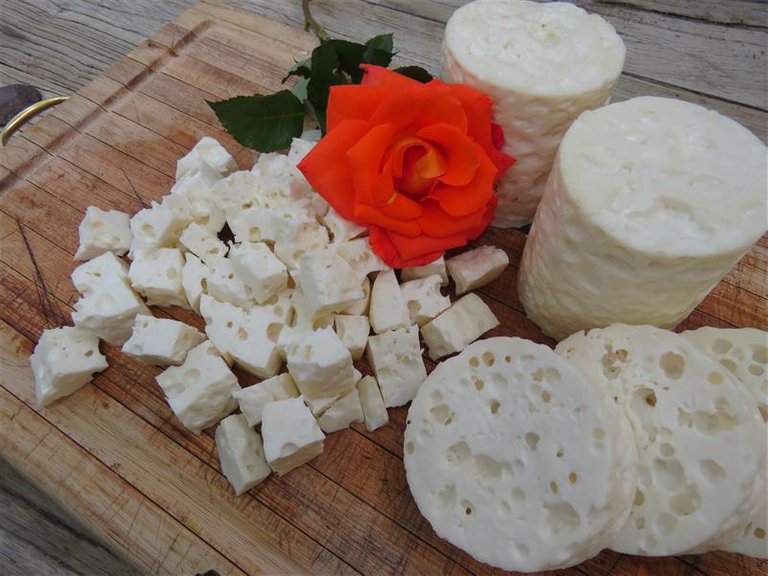
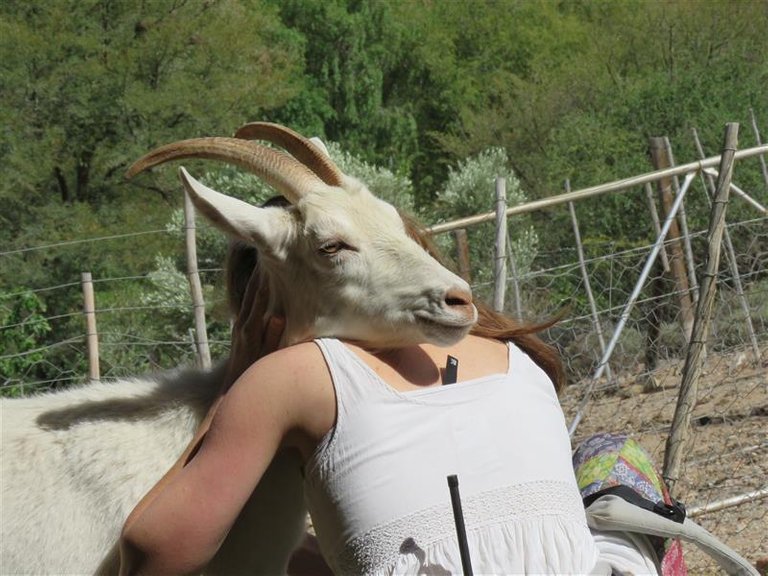
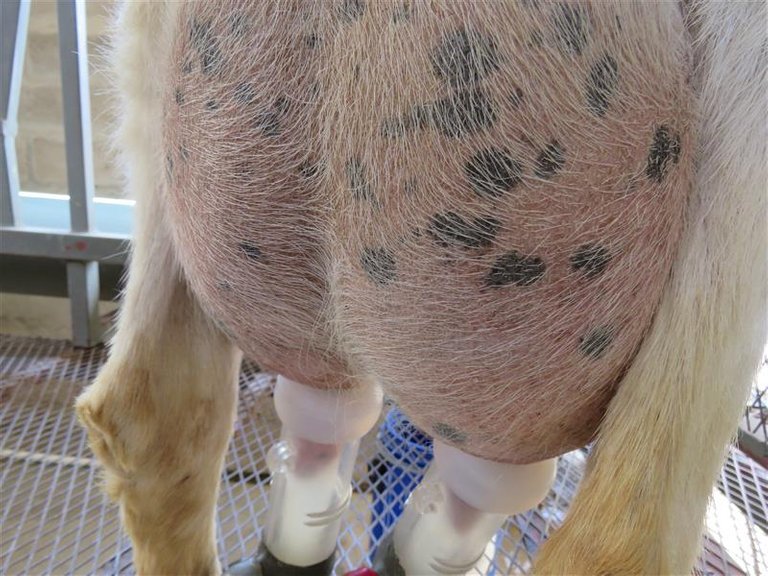
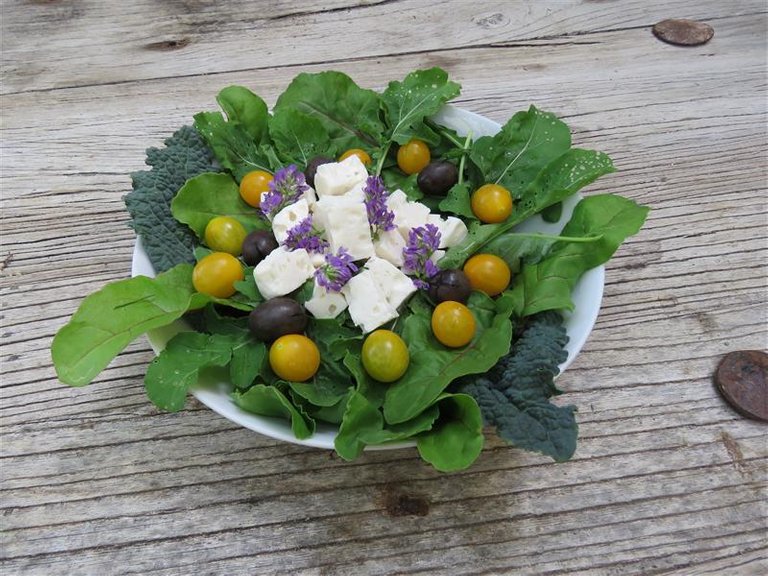
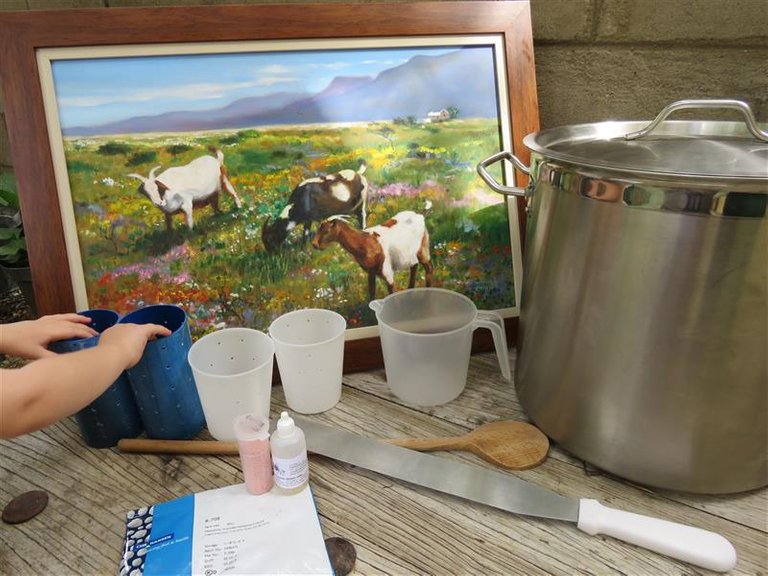
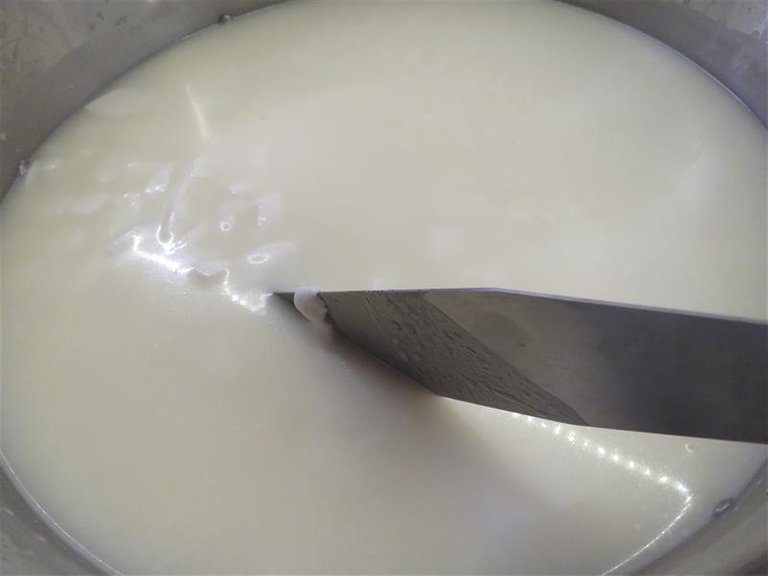
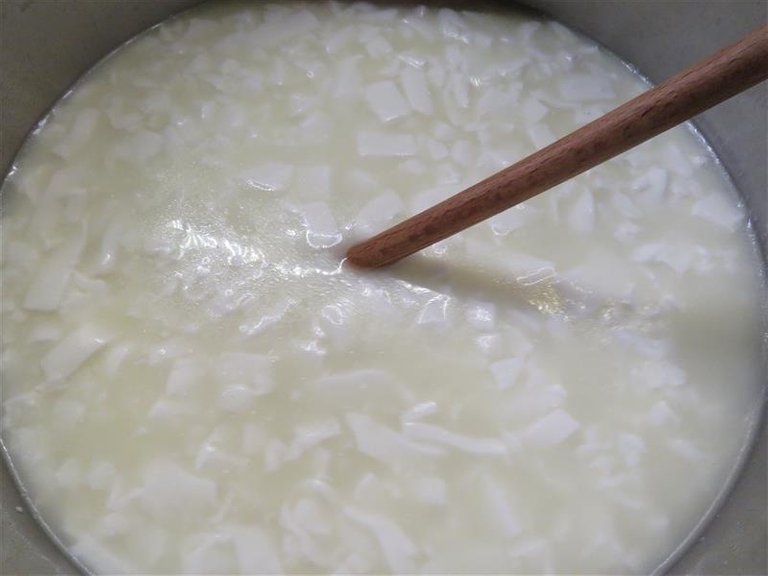
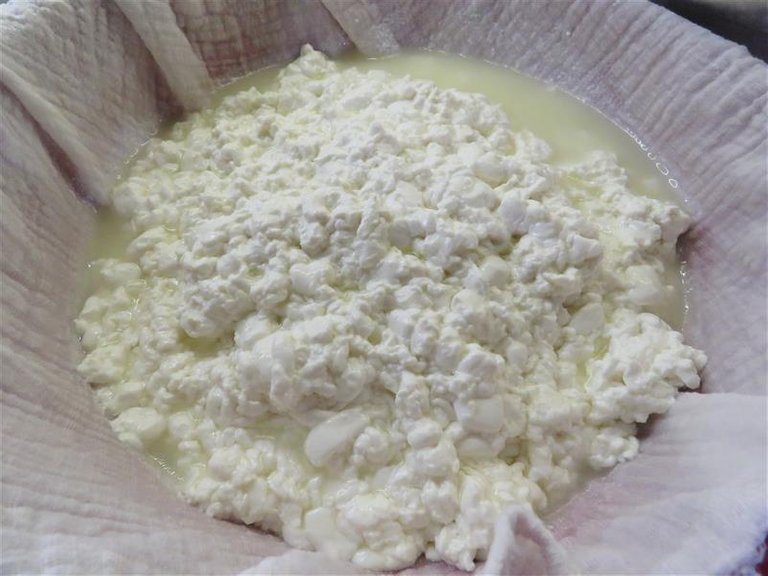
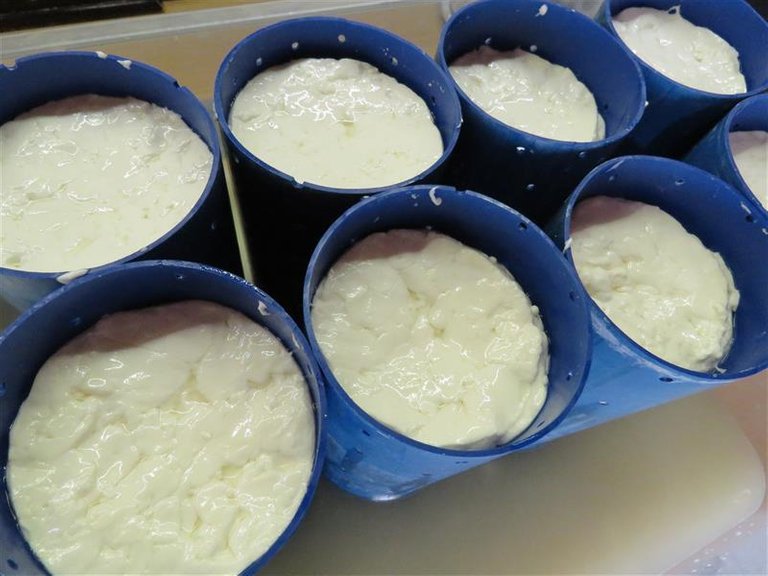
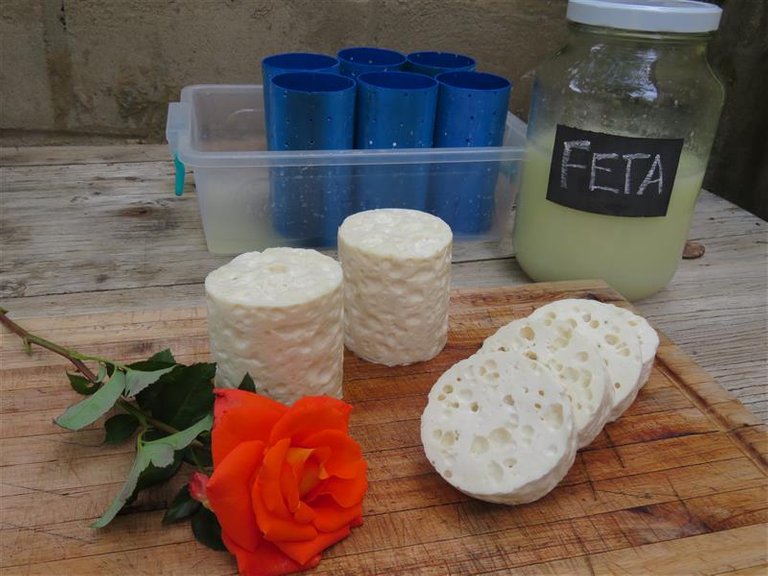
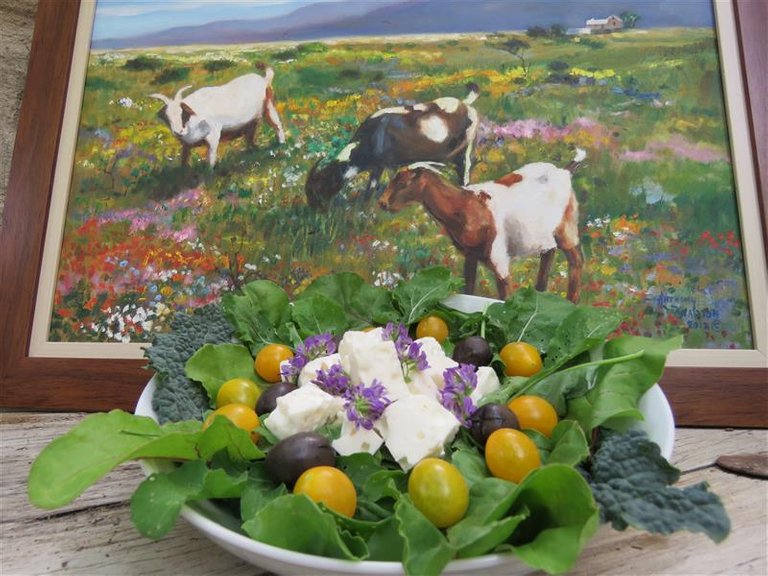
Thank you @pixresteemer!
Hi buckaroo,
Visit curiesteem.com or join the Curie Discord community to learn more.
Thank you @curie!!
Thanks for looking after my sister @curie Cheer$;)
What a lovely post my child! Your artistic talents and writing skills never cease to delight me!!!
I enjoyed watching you effortlessly make different cheeses on my last visit and I look forward to my next one. Bigtime!!
Love you
YAY! The best part of cheesemaking is eating, Dad!
Howdy there buckaroo! wow, this process is simpler than I thought but I can see that it has to be done right too. The instructions, education and photos are all excellent!
As always, such sweet words, thank you @janton
This post was shared in the Curation Collective Discord community for curators, and upvoted and resteemed by the @c-squared community account after manual review.
@c-squared runs a community witness. Please consider using one of your witness votes on us here
Thank you @-squared!
This story was recommended by Steeve to its users and upvoted by one or more of them.
Check @steeveapp to learn more about Steeve, an AI-powered Steem interface.
Thank you @steevebot
Stunning sister, great photography too. I smell a @curie here for sure I am sure the biggest boss of all here too will give you some love, very well done again Steem Queen x
You just read that entire post in 2 minutes? You are even more impressive than I thought the last few decades @craigcryptoking!
Correction, a minute and a half I'm good like that, like a big boss ;) x
Yes .... boss
Woah! :D
Yum!!!
Now for step 1... I'm working on it. I figure it'll cost about a thousand dollars for us to get goats and bees, so I'm saving and buying pieces as I'm able. Going to start by retrofitting the chook house into a chook house/goat barn, then add a bit of fencing for a yard for them all.
Yes, step 1! Better that you need to save up as you also have time to prepare properly (in your head and on your homestead!)
Exactly! And time to get the wife on board 😂😂
Seeing folks like you is really an inspiration. Thanks for this post :)
Aaaah. That is such a sweet comment. Does Melissa read any of these posts? I'll be sharing more cheesemaking recipes (eventually) and the goats milk shampoo bar or soap post is coming up....soon-ish
I forward them to her and pester her about reading them, but she usually read them.
Amazing !!! I love feta and your post makes it really seem possible to anyone to make our own feta :D Wonderfully narrated, and with very nice photos, the final picture makes me want to dive into a feta salad immediately <3
Thank you for your sweet comment @veryspider. I love everything goatie and I find feta a very versatile cheese in many dishes
Oh, I wish I could do this...I looooooove goat cheese, my absolute favorite. You make it look so easy too :) I did of course notice you had a helper....;) Love your post @buckaroo! I know you love your goats, so special!
I also loooooove goat cheese @birdsinparadise! My little helper is a very faithful goat lover and cheese maker! Although he wants to first play with everything
Lovely! Thanks for sharing! When my neighbor starts milking again I must just give it a whirl. Your pictures and description had my mouth watering for a sampling! Wish you were closer for I'd love to have a supply of your awesome goat milk feta!
Aaaaah. You write such sweet compliments @porters. I hope you get to try cheesemaking. A really easy and basic cheese is one I call peasant cheese. You simply get your milk to 32 C and slowly pour in either lemon juice or apple cider vinegar (my theory is 1 lemon per litre, give or take) As soon as the curds form stop pouring. Scoop the curds into a cheesecloth and hang up overnight. That simple!
Hey! Thanks for that simple cheese recipe - a great place to start!
You also get the added goodness of the lemon or the apple cider vinegar!
Exactly! And, while I like the lemon flavour I don't like cheese tasting like ACV so I chop in herbs when I toss the curds into the cheesecloth. But play around. You really can't go wrong!
Thanks for the extra tip! Now I just have to wait until I get fresh milk!
Very well written and thorough post. I have been wondering how homesteaders make milk into cheese, soaps, yogurts, etc.. The finest cheesemakers in the world all seem to have their own secrets to getting the ideal flavor and texture.
Is Feta a Greek cheese originally? The kind in stores is more soft, dry, crumbly, salty. Yours looks more moist, almost between mozzarella and swiss. Looks very yummy. Must be the magic of goat milk and the maker's talent.
Thank you for the compliment @creativetruth. It is actually more dry than it looks. There is a lot that influences the cheesemaking process but the store bought will be vastly different for two reasons. One because it is cow milk and two because it is commerically produced. Very different to the original Greek style!
Hello there!
Wow! I dont know how feta cheese are being made or muh less they are from goats!!.. Im glad i bump into your post. You have written it thoroughly well and very informative too.
You are quite not the normal wife who just wants goat as presents!! Hahahaha.. well as a cheese lover and enthusiast as yourself I understand hahaha. And you just made ne laugh even more on the GOAT RULES! 😂🤣😂
So how many goats do you have in total?
Posted using Partiko Android
@maquemali I'm happy you enjoyed my post so much! I try to make the writing fun to read and not just a long informative article. I used to have 60 goats. But we are in a terrible drought and I sold most of them. I have 3 mothers and 4 babies now
Ooohhhh my! 60 goats!! 😮😮😮 that is quite a big herd to attend to.. and i could just imagine the cheese you will be getting from them.
Its so much fun to inject a little humor in our post as well as in real life. Life can be extremely boring if we dont get to laugh and giggle..hehe
Posted using Partiko Android
wow... @buckaroo, this was first time I saw the progress of making cheese. It look interesting and the cheese make me mouth watering. I like goat milk very much. But not many people like goat milk because of the smell. Your house must be full of goat milk and cheese supply. Have you ever cross your mind make some side income with your goat cheese?
Whoooaaa.. if I had a dairy goat, how small it would be😊 aahh I've been waiting for the post of making this feta goat cheese for months and finally, worth it, @curie pick!
Btw @buckaroo, the same amount of ingredients can be applied to cow milk too? I mean the 25 litres and everything?
Great, I think I'll try do to something like this 😉
Yay! Let me know how it goes @doze
Sure! :)
OMG Thank you for this post I am totally upvoting and resteeming this!!! :)
Thank you @enosh
Wow looks like a lot of work but at least you know where your food is coming from!!
Wooow this is very interesting, unfortunately I do not have a goat so it is not possible for me to make cheese xD But now it is clear to me how that delicious cheese is made !!
I loved this post you have added my desire to eat cheese more than usual, your photographs were good quality and you also did a great writing <33
A big hug @buckaroo
Thank you for your sweet comment @naideth. I always have a reason to eat cheese!!
Feta used to be my absolute favorite. Greek feta is where it’s at for me. I’d put it in salads, over pasta, sometimes I would just eat it with a baguette 🤷🏼♀️ You are incredible @buckaroo. If @dandays and I ever end up in your area we’ll make sure to pop on over for some cheese making tips :)
What a fabulous post @buckaroo and so deserving of a curie vote. Congratulations. I love feta cheese and I'd love to make my own but somehow I don't think I could get away with smuggling a goat into our block of apartments and we don't have any grass growing on our balcony. (lol)
But for people who have the means and the opportunity, they have no excuse now with your very detailed and beautifully presented post. Well Done! (U & R )
Even if you did get away with smuggling the goat in, she'd be bouncing from one apartment to the other and all over their furniture! Soon someone would catch on @trudeehunter!
I'm sure your right @buckaroo I think I'll have to settle for the supermarket version.(lol)
Got very excited when i saw this post. I love Feta and we have an abundance of goat farms around. And strangely enough the only make soft or matured cheese with it. If you want milk you have to get to the farm early, but 20 litres would cost the earth. Anyway I still enjoyed reading how it is done. Thanks.
Posted using Partiko Android
Missed your comment @andyjem! Thank you for your enthusiasm. Sadly goats milk is expensive. I think it is one reason that many opt not to exchange cow for goat milk. Which is why I am happy we have our few goats on our homestead. Goats milk is far better for a person than cow. I find that different goat dairies prefer their few (usually) hard or soft or cultured cheeses. I have tried all of them and I must admit I have my few favourites I prefer making. And eating